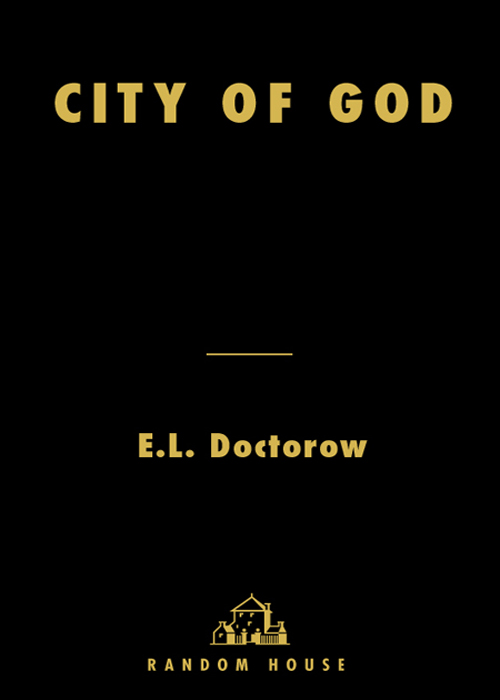
City of God
A Novel
کتاب های مرتبط
- اطلاعات
- نقد و بررسی
- دیدگاه کاربران
نقد و بررسی

Starred review from January 31, 2000
New York at the end of the 20th century--hardly St. Augustine's city of God--is the canvas on which Doctorow paints an impressionistic portrait of man's frail moral nature and the possibilities of redemption. Challenging and provocative, this rambling narrative is a mix of alternating voices that touch on such matters as theology, popular music, astronomy, physics and science, war, carnal love, the verisimilitude of film to life (and distortions thereof). The story is at first difficult to discern, because the abruptly changing voices are not identified. But the episodic selections prove to be passages in a notebook kept by a writer called Everett, who is searching for inspiration for a novel. The easiest thread to follow, since it ties together and finally illuminates the other voices, is Everett's interest in a mysterious theft. In the fall of 1999, the brass cross from the altar of an Episcopal church in the East Village is stolen--and later discovered on the roof of an alternative synogogue on the Upper West Side. Fr. Thomas Pemberton, the spiritually restless rector of St. Timothy's, finds a kindred soul in iconoclastic Rabbi Joshua Gruen, the leader of the Evolutionary Judaism congregation. Together they probe the validity of religion in a century that has fostered epic barbarism and bloodshed. In fugal counterpoint to their conversations, the rabbi's wife, Sarah Blumenthal, herself a rabbi, discloses the story of her father's ordeals during the Holocaust, in which he tells of a manuscript hidden in the ghetto. Ensuing events cause a gentle, grieving Sarah and an unmoored Pem, whose chronic despair, intellectual arrogance and religious skepticism have cost him his pulpit, to draw together in need and understanding. This is merely the scaffolding of a story that ranges from stark tragedy to absurdist comedy, that includes quotations from popular songs from the first three decades of this century as well as speculations on infinity, a scenario for a sadistic love affair, the observations of a bird watcher, a free verse account of a WWII air battle, a consideration of the scientific discoveries that unleashed methodical human extermination and marvelous progress, minibios of Albert Einstein and Frank Sinatra, and the tenets of Christian and Jewish liturgy. Despite the fractured structure, suspense intensifies as the various segments intersect. Doctorow's language is both lyric and bracing, a mix of elegant, precise wordplay and brash vernacular. In a masterwork of characterization, he depicts a gallery of characters (including, hilariously, a retired New York Times editor who becomes an avenging angel) with vivid economy. At once audacious and assured, this profound existential inquiry will surely be ranked as a brilliant mirror of our life and times. 7-city author tour.

October 15, 1999
In fall 1999, a brass cross disappears from St. Timothy's Episcopal Church in Manhattan and reappears at an Upper West Side synagogue, forcing clergy deep into a religious mystery.
Copyright 1999 Library Journal, LLC Used with permission.

January 1, 2000
"The mind considering itself--I shudder; it is too vast, a space without dimension," writes Doctorow, in his new novel, touted as a major work. It's all about a writer working through his ideas, and, indeed, considering his own mind. And like the writer's journal, this novel is propelled by reflections on the universal concerns of living--the qualities of childhood memory, the nature of God, and, particularly, the ever-changing state of the cosmos. The work is peppered with invocations to the "Lord," "Christ, "Jesus," and so forth either by the writer or the characters, real and imagined, in his works-in-progress. Mixed in with Doctorow's philosophical ruminations, there are stories, most centrally two love triangles. One is melodramatic, on the order of a Patricia Highsmith psychological thriller; the other involves two rabbis and a Catholic priest, which includes a story about a runner in a Jewish ghetto during World War II. The latter love story takes over as the writer delves deeper and deeper into that plot about a cross being removed from a Catholic church and planted atop the Synagogue of Evolutionary Judaism. The whole Christian-Jewish subplot is a rumination on the historic relationship between Jews and Christians and an indictment of power that must overcome by subjugating everything in its sphere, which amounts to "the accelerating disaster of human history." In this process of finding something to write about, the writer also puzzles out the form of his work. Is it to be a novel or a movie? In exploring the movie angle, there are passages on popular songs, such as "Stardust," "Dancing in the Dark," and "Shine on Harvest Moon." Tradition versus Reform Judaism. Tradition versus modernity. Pre-millennium versus post-millennium. Oh, where and how shall we proceed? Well, the runner in the Jewish ghetto is awfully compelling, but perhaps that ground was too well traveled. An interesting angle on the travails of the modern writer. ((Reviewed January 1 & 15, 2000))(Reprinted with permission of Booklist, copyright 2000, American Library Association.)

























دیدگاه کاربران